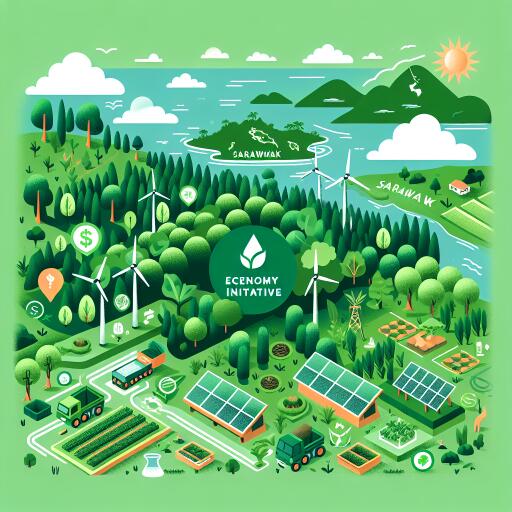
Sagah: Sarawak’s Green Economy Drive to Counteract Climate Change
In the heart of Sarawak, Dato Sri Roland Sagah Wee Inn, Minister of Education, Innovation, and Talent Development, articulates a dynamic vision for a sustainable future. At the forefront of this vision is Sarawak’s commitment to a green economy, a strategic move aimed at mitigating the impacts of climate change through the promotion of renewable energy, ecotourism, and sustainable agriculture practices. Through a synergetic approach that marries the natural landscape with industrial progress, Sarawak aspires to a model of economic development that is not only growth-oriented but also environmentally conscientious and sustainable over the long term.
Highlighting the initiative’s aspirations, the focus centers around developing a hydrogen-based economy and leveraging the state’s bountiful natural resources, notably its forests, for both economic gain and environmental stewardship. The forests are envisioned not just as sources of biomass energy but as vital carbon sinks, indispensable to global efforts in biodiversity preservation. This aligns with the broader Bioeconomy model, which emphasises maintaining both social and biological diversity.
At a recent gathering, details of the initiative came to light, illustrating plans to foster a circular economy. This economy is one that not only seeks to lower carbon emissions through the creation of high-value products but also strives to uphold Sarawak’s rich cultural heritage. It does so by championing traditional knowledge and sustainable methodologies in agriculture and resource management, thereby ensuring the equitable distribution of economic benefits, fostering cultural pride, and supporting the preservation of traditional lifestyles and local crafts.
Furthermore, Sagah touched on educational priorities, underscoring the importance of cultivating a deep-rooted awareness about responsible resource usage and the necessity of balancing economic advancement with environmental preservation. To this end, educational programs in renewable energy, ecotourism, and sustainable agriculture are being developed, aiming to prepare the younger generation to play a significant role in Sarawak’s journey towards a sustainable future.
In its quest to transition into a ‘green’ state powered by clean, renewable energy, while simultaneously climbing the ladder to a high-income economy, Sarawak has not overlooked the vital role of technology-oriented education. This ambition was underscored by the recent announcement of a new aerospace programme at i-CATS University College, a strategic move approved by the Ministry of Higher Education, Malaysia. This initiative is a clear indication of Sarawak’s dedication to fostering a well-trained and knowledgeable workforce, underpinned by a world-class educational system.
Central to achieving the state’s lofty goal of becoming a developed entity by 2030 is the emphasis on human capital development, supported by superior educational frameworks. It’s these strategic educational underpinnings that were a focal point at the 9th BIMP-EAGA Sociocultural and Education Cluster Meeting. The meeting, attended by delegates from Malaysia, Brunei Darussalam, Philippines, and Indonesia, highlighted the role of education and skills development in fostering regional partnerships across higher education and technical vocational education and training institutes.
The deliberations at the meeting laid out a target to implement eight training programs, aimed at encouraging participation from at least two member countries. With an appeal to all members to actively seize the opportunity, the initiative underscores a collective effort towards achieving mutual benefits for all countries involved.
As Sarawak stands at the threshold of transformative change, its green economy initiative emerges not just as a local or national endeavor, but as a beacon for sustainable development in the wider region. By marrying social and environmental considerations with economic imperatives, Sarawak sets a precedent, aspiring to a future where growth and sustainability go hand in hand, setting a vibrant example for the global community.





Leave a Reply